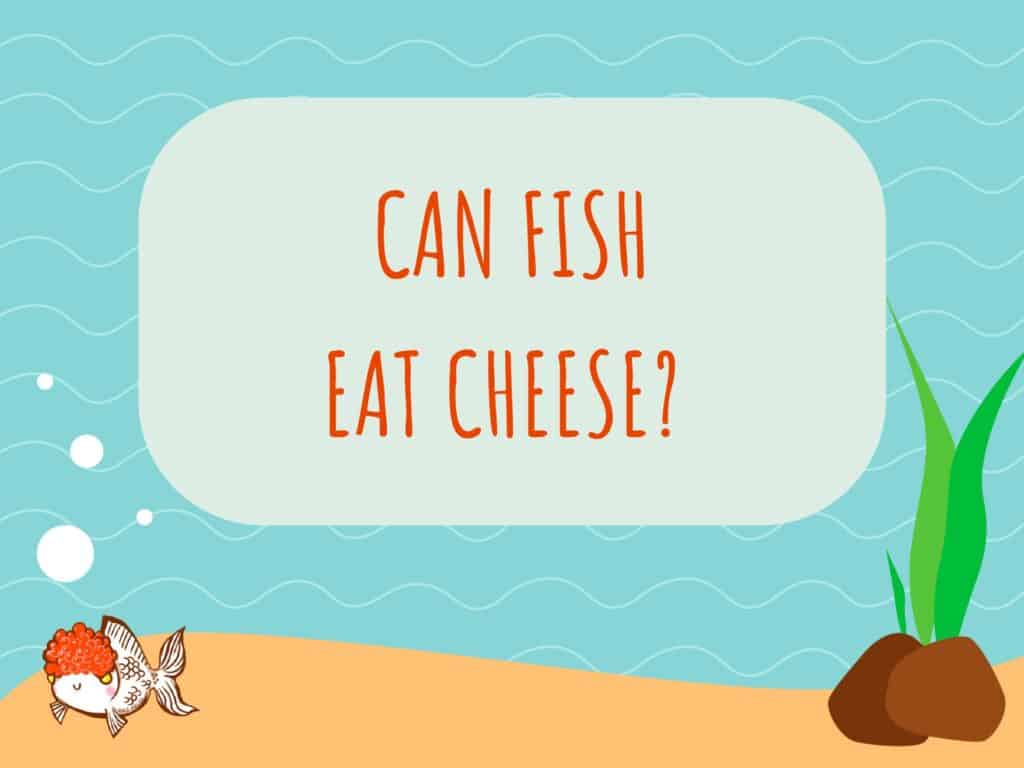Fish is one of my favorite snack foods, and I use it in cooking, too. But I wondered recently if my fish would appreciate the addition of a few crumbs of this popular food to their diet.
So, I did some research, and it turns out that fish cannot eat cheese, and feeding it to them can be harmful.
If you’ve been asking yourself, “Can fish eat cheese,” keep reading to find out why feeding your fish cheese is not a great idea.
Can My Fish Eat Cheese?
No, you should not feed cheese to your fish.
But why not?
There are some human foods that fish can eat, but dairy products are not one of them.
Cheese is packed with protein, fat, and calcium, so on the face of it, when eaten in moderation, cheese is a healthy addition to your diet.
However, you need an enzyme called lactase to break down the lactose sugar in milk and milk products, such as cheese. Fish don’t need lactase to digest their usual diet, so their bodies don’t produce it. That means fish cannot digest dairy products, including cheese.
Do Fish Like Cheese?
Many fish species are attracted to food items with a strong smell, so some types of cheese are certainly attractive to fish. In fact, many anglers use a piece of cheese paste bait as an effective fishing lure for catfish and other popular wild fish species, including chub, pike, and tench.
The difference here is that these common fish are destined for the plate or will be released once the sportsman has weighed his catch, so the fish don’t actually ingest the chunks of cheese once they’re caught.
Reasons Why Your Pet Fish Cannot Eat Cheese
Here are a few reasons why you shouldn’t give your pet fish cheese.
Fish Cannot Digest Lactose
So, the main reason fish can’t eat cheese is that their bodies cannot digest it. As explained previously, most fish species have little or no lactase, so their bodies cannot process the lactose in the cheese.
Cheese Can Cause Health Problems in Fish
Lactose causes lots of problems in tropical and freshwater fish. The fish often produce mucus-covered or watery feces and can become bloated.
Cheese contains high levels of fat, salt, and cholesterol, all of which can cause serious health problems for your pet fish.
Bloat
Bloat is a serious problem that can affect cold water and tropical fish species. Bloat causes the fish’s stomach to swell and become distended, displacing the swim bladder so that the fish can no longer swim on an even keel.
Affected fish sometimes end up floating on the water’s surface, swimming on one side, or becoming trapped on the tank bottom, unable to swim up to the surface again. That can be extremely dangerous for fish such as bettas, which need to access the surface regularly to breathe through their labyrinth organ.
In some fish species, a bloated abdomen can be fatal.
Adaptation
Fish are aquatic creatures that eat what they find in their natural habitat.
For example, omnivorous fish feed on a mixture of plant matter, algae, tiny crustaceans, worms, insect larvae, and insects. Carnivorous fish eat a diet consisting solely of meat, including shrimp, mollusks, small fish, worms, and the like, whereas herbivores live on a plant matter and algae diet.
Obviously, cheese is not found in the underwater environment, so it doesn’t appear on the usual menu of any fish species. If fishes are to eat cheese, they must adapt their bodies to doing so, and that can take hundreds of years of evolution to achieve!
Can My Fish Eat Cheese Puffs?
If you can’t feed your fish cheese, what about cheese puffs or crackers? That would provide your fish with the taste of cheese but not the lactose it contains.
Although, in theory, you can feed puffs or crackers to fish, I would advise against that.
Crackers must be crumbled into small, manageable pieces for the fish to eat, and that can lead to the crackers breaking down in the water. Crumbled crackers quickly turn to mush, clouding the water and causing problems for your filtration system.
In addition, like bread, crackers can cause harmful bloating and constipation in some fish species.
Stick To Healthy Treats!
There are plenty of healthy fish food treats that you can offer your fish, such as frozen and freeze-dried bloodworms, daphnia, and brine shrimp, so there’s really no reason to give your fish human food.
Final Thoughts
Did you enjoy our guide on why fish can’t eat cheese? If you did, please share the article with other curious fishkeepers!
Although coarse fishermen often use strong-smelling cheese as fishing bait, you shouldn’t offer it to your pet tropical or coldwater fish. Fish are not evolved to process the lactose that cheese contains, and feeding it to them can cause serious health problems for your pets.


